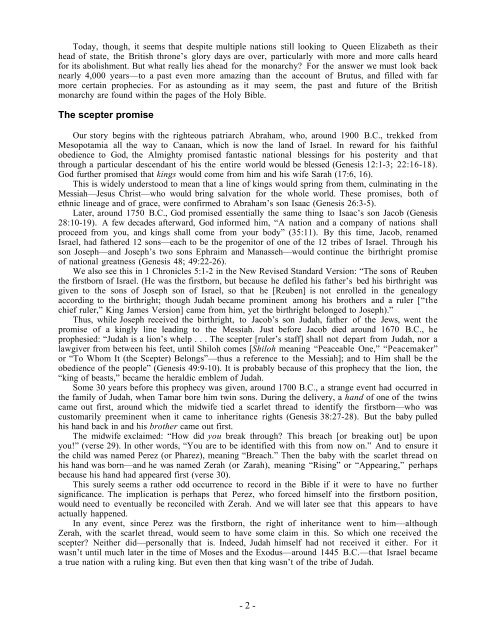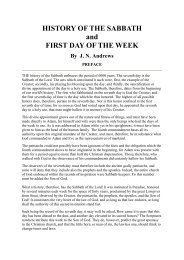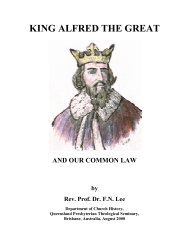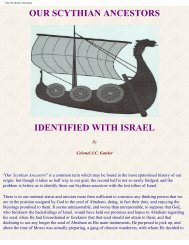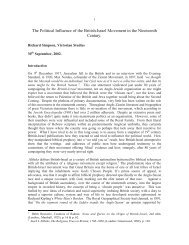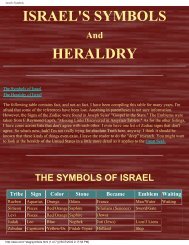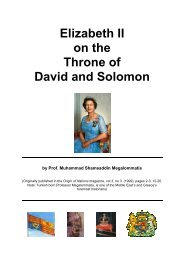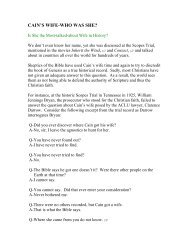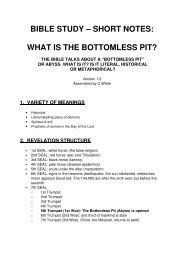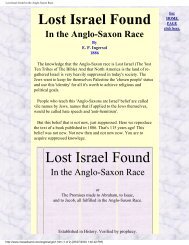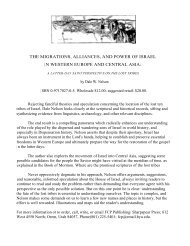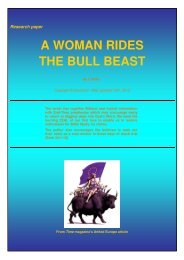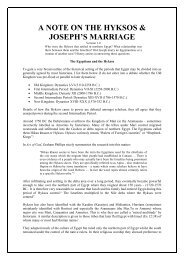The Throne of Britain: Its Biblical Origin and Future - Origin of Nations
The Throne of Britain: Its Biblical Origin and Future - Origin of Nations
The Throne of Britain: Its Biblical Origin and Future - Origin of Nations
You also want an ePaper? Increase the reach of your titles
YUMPU automatically turns print PDFs into web optimized ePapers that Google loves.
Today, though, it seems that despite multiple nations still looking to Queen Elizabeth as their<br />
head <strong>of</strong> state, the British throne’s glory days are over, particularly with more <strong>and</strong> more calls heard<br />
for its abolishment. But what really lies ahead for the monarchy For the answer we must look back<br />
nearly 4,000 years—to a past even more amazing than the account <strong>of</strong> Brutus, <strong>and</strong> filled with far<br />
more certain prophecies. For as astounding as it may seem, the past <strong>and</strong> future <strong>of</strong> the British<br />
monarchy are found within the pages <strong>of</strong> the Holy Bible.<br />
<strong>The</strong> scepter promise<br />
Our story begins with the righteous patriarch Abraham, who, around 1900 B.C., trekked from<br />
Mesopotamia all the way to Canaan, which is now the l<strong>and</strong> <strong>of</strong> Israel. In reward for his faithful<br />
obedience to God, the Almighty promised fantastic national blessings for his posterity <strong>and</strong> that<br />
through a particular descendant <strong>of</strong> his the entire world would be blessed (Genesis 12:1-3; 22:16-18).<br />
God further promised that kings would come from him <strong>and</strong> his wife Sarah (17:6, 16).<br />
This is widely understood to mean that a line <strong>of</strong> kings would spring from them, culminating in the<br />
Messiah—Jesus Christ—who would bring salvation for the whole world. <strong>The</strong>se promises, both <strong>of</strong><br />
ethnic lineage <strong>and</strong> <strong>of</strong> grace, were confirmed to Abraham’s son Isaac (Genesis 26:3-5).<br />
Later, around 1750 B.C., God promised essentially the same thing to Isaac’s son Jacob (Genesis<br />
28:10-19). A few decades afterward, God informed him, “A nation <strong>and</strong> a company <strong>of</strong> nations shall<br />
proceed from you, <strong>and</strong> kings shall come from your body” (35:11). By this time, Jacob, renamed<br />
Israel, had fathered 12 sons—each to be the progenitor <strong>of</strong> one <strong>of</strong> the 12 tribes <strong>of</strong> Israel. Through his<br />
son Joseph—<strong>and</strong> Joseph’s two sons Ephraim <strong>and</strong> Manasseh—would continue the birthright promise<br />
<strong>of</strong> national greatness (Genesis 48; 49:22-26).<br />
We also see this in 1 Chronicles 5:1-2 in the New Revised St<strong>and</strong>ard Version: “<strong>The</strong> sons <strong>of</strong> Reuben<br />
the firstborn <strong>of</strong> Israel. (He was the firstborn, but because he defiled his father’s bed his birthright was<br />
given to the sons <strong>of</strong> Joseph son <strong>of</strong> Israel, so that he [Reuben] is not enrolled in the genealogy<br />
according to the birthright; though Judah became prominent among his brothers <strong>and</strong> a ruler [“the<br />
chief ruler,” King James Version] came from him, yet the birthright belonged to Joseph).”<br />
Thus, while Joseph received the birthright, to Jacob’s son Judah, father <strong>of</strong> the Jews, went the<br />
promise <strong>of</strong> a kingly line leading to the Messiah. Just before Jacob died around 1670 B.C., he<br />
prophesied: “Judah is a lion’s whelp . . . <strong>The</strong> scepter [ruler’s staff] shall not depart from Judah, nor a<br />
lawgiver from between his feet, until Shiloh comes [Shiloh meaning “Peaceable One,” “Peacemaker”<br />
or “To Whom It (the Scepter) Belongs”—thus a reference to the Messiah]; <strong>and</strong> to Him shall be the<br />
obedience <strong>of</strong> the people” (Genesis 49:9-10). It is probably because <strong>of</strong> this prophecy that the lion, the<br />
“king <strong>of</strong> beasts,” became the heraldic emblem <strong>of</strong> Judah.<br />
Some 30 years before this prophecy was given, around 1700 B.C., a strange event had occurred in<br />
the family <strong>of</strong> Judah, when Tamar bore him twin sons. During the delivery, a h<strong>and</strong> <strong>of</strong> one <strong>of</strong> the twins<br />
came out first, around which the midwife tied a scarlet thread to identify the firstborn—who was<br />
customarily preeminent when it came to inheritance rights (Genesis 38:27-28). But the baby pulled<br />
his h<strong>and</strong> back in <strong>and</strong> his brother came out first.<br />
<strong>The</strong> midwife exclaimed: “How did you break through This breach [or breaking out] be upon<br />
you!” (verse 29). In other words, “You are to be identified with this from now on.” And to ensure it<br />
the child was named Perez (or Pharez), meaning “Breach.” <strong>The</strong>n the baby with the scarlet thread on<br />
his h<strong>and</strong> was born—<strong>and</strong> he was named Zerah (or Zarah), meaning “Rising” or “Appearing,” perhaps<br />
because his h<strong>and</strong> had appeared first (verse 30).<br />
This surely seems a rather odd occurrence to record in the Bible if it were to have no further<br />
significance. <strong>The</strong> implication is perhaps that Perez, who forced himself into the firstborn position,<br />
would need to eventually be reconciled with Zerah. And we will later see that this appears to have<br />
actually happened.<br />
In any event, since Perez was the firstborn, the right <strong>of</strong> inheritance went to him—although<br />
Zerah, with the scarlet thread, would seem to have some claim in this. So which one received the<br />
scepter Neither did—personally that is. Indeed, Judah himself had not received it either. For it<br />
wasn’t until much later in the time <strong>of</strong> Moses <strong>and</strong> the Exodus—around 1445 B.C.—that Israel became<br />
a true nation with a ruling king. But even then that king wasn’t <strong>of</strong> the tribe <strong>of</strong> Judah.<br />
- 2 -


